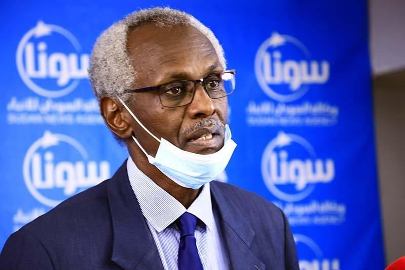Resorting to UN Security Council over GERD issue is possible: Sudan
April 7, 2021 (KHARTOUM) – Ethiopia’s rejection of international mediation in the GERD process may reveal hidden intentions, so resorting to the Security Council remains an option to reach a binding agreement, said the irrigation minister on Wednesday.
During a series of meetings in Kinshasa, Egypt, Ethiopia and Sudan failed to strike a deal over a new negotiation mechanism led by the African Union, with the participation of the United Nations, the United States and the European Union.
In a press conference held in Khartoum on Wednesday, the Sudanese Minister of Irrigation Yasir Abbas revealed the details of what happened in Kinshasha meetings.
Abbas said the Sudanese delegation had abandoned its proposal for a four-way mediation and accepted an Egyptian proposal replacing the mediators with facilitators, but Ethiopia also rejected this.
“On the third day, Egypt proposed the same text proposed by the African Union on June 26, 2020, which stipulated that there should be no mediation or facilitators, but the parties must reach a binding agreement within 8 weeks. Also, it gives the AU Chairperson the right to seek assistance from whomever he deems appropriate,” he said.
“But Ethiopia once again rejected this proposition,” he stressed.
The Sudanese minister pointing out that Ethiopia does not want the participation of the United Nations in the process, saying it was not a party to the negotiations.
He emphasized that his country does not adhere to the four-way mechanism, but rather submitted this proposal because they believe in the need for mediation to facilitate reaching an agreement on filling and operating the Renaissance Dam.
“There are no logical reasons that justify Ethiopia’s rejection of the principle of mediation. Perhaps, there are other intentions to refuse in order to complete the second filling without an agreement,” he said.
The minister said that filing a complaint to the Security Council again remains one of the options that his government can resort to.
“All options remain open, including returning to the Security Council,” he said.
During the press conference, Abbas repeated that filling and operating the dam without an agreement affects Sudan’s national security and threatens 20 million of its inhabitants.
Also, he urged the international community to pay attention to the threat his country is facing before it is too late.
It is not clear if the three countries would meet soon as the head of the African Union President Félix Antoine Tshisekedi did not issue a statement on the outcome of the talks.
The Ethiopian foreign ministry said Sudan and Egypt “followed an approach that seeks to undermine the AU-led process and to take the matter out of the African platform”.
Addis Ababa in a statement released on Tuesday asserted that the second-year filling of the GERD will be carried out as scheduled next July.
“In this context, Ethiopia expressed its readiness to facilitate data and information exchange on the filling of the dam,” further reads the statement.
Egypt for its part said that the Kinshasa meeting may be the last chance to re-launch talks before the second filling of the giant dam.
“These negotiations represent the final opportunity the three countries must seize in order to reach an agreement … before the upcoming floods season,” says a statement released by the Egyptian foreign minister.
In June 2020, Egypt called for the intervention of the UN Security Council in the stalled talks over the GERD filling and operation. However, Sudan at the time called to give the African Union a chance to break the stalemate.
(ST)

